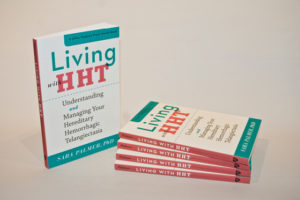Living with HHT Book

Have you read my new book, Living with HHT: Understanding and Managing Your Hereditary Hemorrhagic Telangiectasia? It’s designed to tell you everything you need to know about HHT to keep yourself and your family as healthy as possible and to cope with the stresses of having HHT.
I’m happy to report that the book, released in December, 2017 by Johns Hopkins University Press, can now be ordered through Cure HHT or any major book seller. I am donating all royalties from the book to Cure HHT in support of their mission to find, treat and cure HHT.
Few people are familiar with HHT, an uncommon blood vessel disorder affecting about 1 in 5000 people around the world. Even if you’ve been diagnosed with HHT, you may be unclear what to do next. So today I’ll introduce you to HHT—what it is and when to get tested for it.
What is HHT? HHT stands for Hereditary Hemorrhagic Telangiectasia—a mouthful of medical terminology! Here’s what it means:
Hereditary (genetic; inherited)
Hemorrhagic (causes bleeding)
Telangiectasia (abnormal blood vessel)
In other words, HHT is inherited; it causes bleeding; and the bleeding comes from abnormal blood vessels. HHT is caused by a mutation in one of three genes related to blood vessel development. If you have HHT, each of your children has a 50% chance of inheriting the disease. Only some of the blood vessels in people with HHT are abnormal or malformed. In these malformations, there is a direct connection between an artery and a vein, while normal capillaries (the smallest blood vessels) are missing. These malformations commonly occur in nose, gastrointestinal tract (gut), or on the skin (where they are called telangiectasias) and in the lungs, brain, or liver (where they are called arteriovenous malformations (AVMs)). The location, size and number of these abnormal vessels are different in each person with HHT, even within the same family. Some people with undiagnosed lung or brain AVMs will have serious medical complications, while others remain symptom-free. And many medical problems associated with HHT can be caused by other illnesses. All of these factors make it difficult to know if you or your family has HHT.
When to Get Tested for HHT? A variety of symptoms and medical complications result from HHT. Nosebleeds (caused by bleeding from telangiectasias in the nose) are the most common symptom of HHT, affecting about 95% of people with HHT by the time they reach middle age. Anemia (low red blood cell count) can result from telangiectasias bleeding in the gut (or from frequent nosebleeds); anemia causes fatigue, shortness of breath and weakness. Multiple small red spots (telangiectasias) on the lips, tongue, fingertips or face, while not harmful, are important in diagnosing HHT. Heart failure can result from AVMs in the liver, though this is uncommon. Stroke, brain abscess (infection) and lung or brain hemorrhage (bleeding)—most of the serious complications in HHT—come from AVMs in the lungs and brain that have not been diagnosed or treated.
HHT should be suspected if a pattern of these symptoms and complications exists in one person or in multiple family members. If you have frequent nosebleeds and you had a stroke or brain abscess with no known cause, then you might have HHT. If you have nosebleeds and your father has many red spots on his face and lips, then you and your family might have HHT. Nosebleeds alone may be a reason to suspect HHT, especially if they are frequent, persist into adulthood and/or are present in multiple generations of your family.
The best way to get tested for HHT is to visit one of the many HHT Centers of Excellence in the US, Canada and other countries (a list of Centers can be found in Living with HHT or at www.curehht.org). The diagnosis of HHT is made by a physician using established criteria including symptoms, family history, and screening tests, or by genetic testing.
What happens after I’m tested? If you’ve been diagnosed with HHT, there are two essential steps you should take: 1) get screening tests to find out whether you have AVMs in your lungs or brain. Strokes, brain abscesses and brain hemorrhages due to lung and brain AVMs are almost all preventable—but only if the AVMs are discovered and treated. 2) Tell your parents, siblings and children that they are also at risk for HHT. They should be tested, either with genetic testing or by clinical examination and screening for AVMs in the lungs and brain. If it turns out you don’t have HHT, then you cannot pass it on to your children; but if your family has the symptom pattern described above, then one of your parents and one or more of your siblings could have HHT, and they need to be tested.
When you know you have HHT, you can get the tests and treatments you need to stay healthy, learn to manage your symptoms and prevent many serious complications. Most people with HHT can live full lives, and researchers are developing new treatments for those who are limited by HHT related illness and disability. So if you think you have HHT, get tested, get screened and get treated! Tell your family and encourage them to do the same.
Want to know more about HHT? In Living with HHT, you will find in-depth discussions of symptoms, diagnosis and screening tests; treatments, procedures and preventive measures; research advances; and how to cope with the emotional and social stress of having HHT. You can read my prior blog from June, 2017, and stay tuned for a future blog post on treatment options. For more information, visit www.curehht.org.

Hi my name is Rhonda and l live in Sydney Australia. My husband has HHT. I would love to get your book. Is there any way you could post a copy to me please. I will of cause pay for it. There are many people here that are affected by HHT but unfortunately no one knows much about it. Even the hospital where he goes for iron infusions none of the staff know about his condition. His ear nose and throat specialists says there is nothing they can do for him.
Regards
Rhonda Gooding
Hi Rhonda.
Can you get books mailed to you by amazon.com in Australia? If so, you should be able to buy it through them. You can order a kindle copy of the book through amazon.com if you have a kindle e-reader, which saves on shipping fees.
You can also order the book directly from Johns Hopkins Press online.
Another suggestion is to ask your local bookstore or library to order the book for you directly from the publisher.
I hope that helps.
Contact Professor Richard Harvey. Sydney ENT.
I have HHT And live in Reno NV USA I am 65 and have led a productive life having 3 children and 4 grandchildren. I have had 58 laser or cautery treatments under total anesthesia since I was 35 or so. I have to constantly find new things to moisten my nose. Gels,aloe Vera, and a spray called Alcholol. My hemoglobin has gotten down to 3.7 and many times is around 6. I have had (Venofer) infusions which is synthetic iron. I have never had a blood transfusion. So there are things the ENT can definitely learn to do for your husband. He will not be able to take any aspirin or blood thinning products. Even check your vitamins and foods you eat. I cannot take any allergy meds or mucinex etc. the alcolol is a nose cleaner. And a moisturizer.
Sharon can you please tell me out of the 58 times you’ve had treatment for your nosebleeds, have you had Coblation & Avastin? I’m 53, I have always been able to take care of my bleeding – not anemic but my Ferritin is hanging at the end of normal 27… everything else really good.
Recently I’ve developed a large telangectasia at the end if my middle turbinate. It’s so far, it can’t be reached to apply pressure and I panic which makes my heart pump as if I’m running- it hemorrhages for a very long time. I’m scheduled for this on 6/13 and it gives me time to research. Any advice for what you’ve experienced is greatly appreciated.
How can I purchase this book?
I just bought it on Amazon.
I am a 53 yr old female. HHT I got diagnosed with it at age 13, I had a AVM In right lung so I needed a lung resection. I also had nosebleeds and headaches throughout my life. This bleed was in 1979 .i went on to have kids one in 1990 and Twins in 1992 , they were born at 26 weeks, one weighed 630 grams and one weighed 930 grams, the smaller one ended up passing at 6 months, I guess he had Down syndrome. I was fine and seemed healthy just got tired easy. Then in October 1996 I was coughing blood up , the said I would need surgery which they would do in FEBUARY, well January 16 I coughed and puked up a lot of blood all over my new bathroom and hallway. It was another AVM IN THE left lung. I had surgery that night, then two weeks later while still in hospital I started throwing up blood, like I thought I was going to die I now have had so many blood transfusions. I now needed stomach surgery to to remove my stomach due to many bleeding ulcers. They ended up saving half my stomach. Released home end of FEBUARY. Started getting really bad backaches, they said it was from losing so much weight. I turned yellow and after many tests and Drs looking a me, it was my grandmas liver specialist that said this lady has got HHT affecting her liver, I had a bunch of accesses. I needed a Liver Transplant. I was only 31 with two little children. I was in and out of hospital for two years Now besides HHT I also have Crohn’s disease, psoriasis, congestive heart failure, ,CKD,COPD. The Drs are checking my brain to see if HHT is doing anything up there, cause I get a lot of bad headaches. I am going to be 54 in October. No women in my family have lived past 55. Praying that I am the first.
hi i have JPS/HHT that was only diagnosed recently in 2016 when i was 43yrs old. im from New Zealand where there is NO HHT clinic, no HHT specialists or doctors as such. However some specialists have/do treat patience who have HHT so are familiar with it on a very small scale but again not specifically specialists in completely understanding the nature of HHT. In fact most doctors have only briefly heard of HHT and or dont know anything about it, and nurses and paramedics have never heard of HHT. I have had bleeding noses from a small child until early adulthood when my nose was surgically quarterized. I had bowel cancer removed 2019, and have polyps that are being treated/watched by GI specialist. I had a brain aneurysm coiled, i have lung avm -some have been coiled but needing my 8mm pavm coiled.
im thinking of getting this book but wondering does it mention JPS/HHT
many thanks Tam